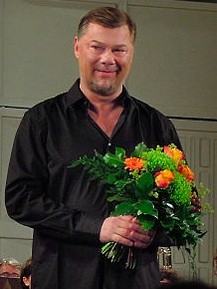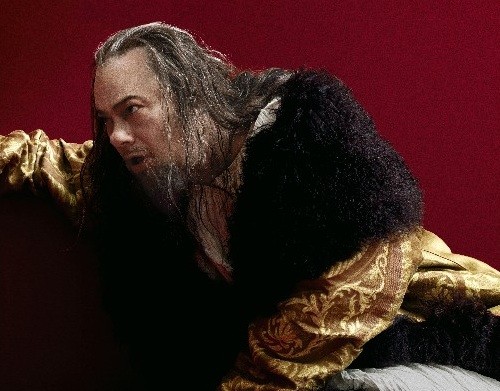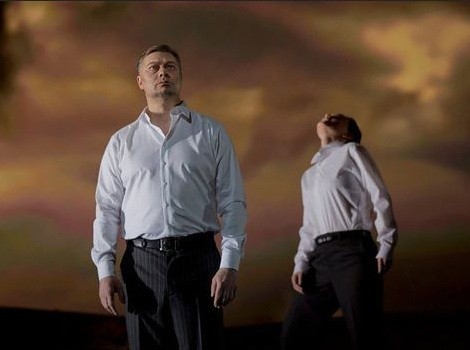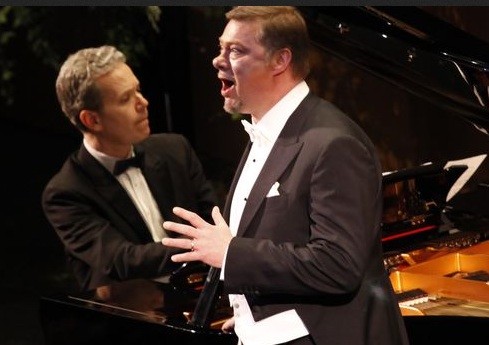Rene Pape in Concert at the Met
His Appetite for Life Colors the Singing
By: Susan Hall - Sep 28, 2014
Rene Pape, Bass
Camillo Radicke
Beethoven, Op. 48
Dvorak, Biblical Songs
Quilter, Three Shakespeare Songs
Mussorgsky, Dances of Death
Metropolitan Opera House
September 28, 2014
Pape is a natural. With a large voice that flows easily and a perfect instinct for the phrase, for dynamics and for drama he is one of the most gifted singers performing today. He is completing 2014 in performances in Macbeth and the Magic Flute and also Tristan and Iseult. No one will ever forget his Gurnemanz in Parsifal.
There was a moment in Parsifal when Pape sang about the annointment of the new King. He said, "I was so moved that I was shaking...it took me several minutes to calm down." Everyone felt the tension in the air. Pape wa not talking about his singing, but about his reaction to Wagner's music.
In his selection of songs, it was clear that he was listening and delivering the music of Beethoven and Dvorak, of the composers and their intention. He was not commenting on his own singing.
His program was brave and daring. Beethoven songs which began the afternoon were based on the poetry of Gellert and are a variety of addresses to God. In his commanding presence, and complete attention to emotional implication, Pape showed us how far he can extend dynamic range. Other singers try to pull off the whispered phrase, but only Pape does it perfectly. The stars flickered in the sixth song, and Camillo Radicke accompanied in seamless rhythms.
Pape's sense of humor is as graceful and compelling as his dramatic range. When applause erupted at an inappropriate place, he glared with a teasing good humor. Rattled by the unfortunate soprano who the Met keeps casting, Marina Poplavskaya, in a recent Faust production, he whispered in her ear so the entire Met audience could hear as she began Marguerite's famous Jewel Song, "Diamonds are a Girl's Best Friend."
Pape is known to be indulgent of women, booze, cigarette, and let's face it, life. He has said, "I suppose I should be
more careful, but on the other hand, you will be good onstage if you live a real life. If you take yourself out of real life and overprotect yourself, you cannot make real music. It will always be fake."
Pape's low placement does not sound guttural. It does not wobble. His tones are totally focused. He smiles as he sings, but not because he is amused, but so he can facilitate his technique and keep his tone frontal. His perfect technique is used to produce tonal color as he wants it. He can make his notes round and dark or bright and open. He is relaxed because this is his voice, not one that is made up of many selected pieces, the fault of so many singers today. His vibrato is also natural and pleasing. With hiis superior technique, he explores expression in the service of musicianship.
Pape's English is first rate. Songs from Shakespeare, by the late 19th century composer Quilter,were delightful. His final encore was a selection was from Camelot. His promise 'never to leave' was not kept, but enticed an audience that would never let this great lyric bass go. Pape loves blues and hard rock too. He is a musical polymath.
The house was sparsely populated. The Met offered a free glass of champagne with the purchase of tickets. I was paper and so were many of my friends. Although the Metropolitan Opera house is thankfully one of Pape's homes, it is too big for a recital. Pape's voice comfortably fills the hall, but recitals and perhaps even operas now belong in smaller homes. A great artist like Pape clearly demonstrates this. Lincoln Center slogs on hoping that tourists' bucket lists will solve their attendance problems.





